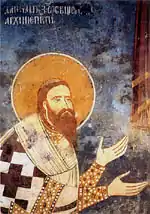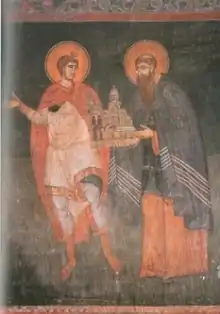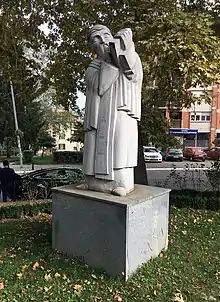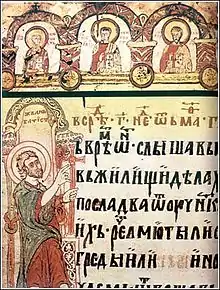Danilo II (Archbishop of Serbs)
Danilo II (Serbian Cyrillic: Данило II) was the Archbishop of Serbs 1324 to 1337, under the rule of Kings Stephen Uroš III (1321–1331) and Dušan the Mighty (1331–1355, crowned Emperor in 1345). As a Serbian monk, he was also a chronicler, active in court and Church politics, holding the office during the zenith of the Nemanjić dynasty-era; he wrote many biographies which are considered part of the most notable medieval Serbian literature. He was proclaimed Saint Danilo II (Свети Данило II) of the Serbian Orthodox Church, and is celebrated on the same day as Saint Ignatius of Antioch on 2 January [O.S. 20 December].
Danilo II Данило II | |
|---|---|
 | |
| Archbishop of All Serbia and Serbian Maritime Lands | |
| Church | Serbian Orthodox Church |
| See | Monastery of Peć |
| Installed | 1324 |
| Term ended | 1337 |
| Predecessor | Nikodim I |
| Successor | Joanikije II |
| Personal details | |
| Nationality | Serb |
| Denomination | Eastern Orthodox Christian |
| Sainthood | |
| Feast day | 2 January [O.S. 20 December] |
| Canonized | by Serbian Orthodox Church |
Life and work

Born around 1270 in the župa of Pilot (present-day Pult, in northern Albania),[1] his given name has not been recorded, only that he belonged to a Serbian noble family.[1][2] He was endowed with a fine intellect and a noble disposition; he had received an excellent education at the hands of the most learned men in Medieval Serbia and in Byzantium. After his education, he joined the court of the Serbian king Stefan Milutin, which he left around 1300 to join the monastery of Končul on the Ibar river.[1] After his novitiate, he went to Peć at the request of the Serbian archbishop Jevstatije, where he was made a presbyter priest.[3] After that, he progressed quickly in the ecclesiastical hierarchy of the Serbian Orthodox Church: first as abbot of Hilandar (c. 1306-1311), then as bishop of Banjska (1312-1315), and finally as archbishop from 1324 until his death in 1337.[4] He died on 19 December 1337 and was buried in one of the churches he had built in the monastery of Peć, Our Lady Hodegetria.[5]
Danilo wrote biographies of Serbian medieval kings and archbishops, including the biography of Jelena, the wife of King Stephen Uroš I of Serbia (1243–1276). His monumental work is referred to in the poetry of Serbian folklore as knjige starostavne (the ancient books) and knjige carostavne (the royal books). As a result of his work, many historical details concerning both the rulers of medieval Serbia and the members of the Nemanjić dynasty have been preserved.
See also
- Jefimija
- Princess Milica of Serbia
- Stefan Lazarević
- Teodosije
- Domentijan
- Stefan Dušan
- Teodosije the Hilandarian (1246-1328), one of the most important Serbian writers in the Middle Ages
- Miroslav Gospel
- Gabriel the Hilandarian
- Danilo's anonymous pupil
References
- McDaniel 1980, p. 38.
- Thomson 1993, p. 103.
- McDaniel 1980, p. 38-39.
- McDaniel 1980, p. 39.
- Thomson 1993, p. 106.
- Translated and adapted from Serbian: https://www.rastko.rs/kosovo/pecarsija/ljudi/vl_sava-danilo_II_l.html
Sources
- Episkop šumadijski Sava (2001) [1996]. "Sveti Danilo II arhiepiskop srpski". Srpski jerarsi od IX do XX veka (in Serbian). Projekat Rastko. Archived from the original on 2015-04-02.
- Лопандић, Душко (2009). "Архиепископ српски Данило II" (in Serbian). Politikin zabavnik. Archived from the original on 2014-06-04.
- Justin Sp Popović (1976). Žitija svetih (in Serbian). Izdanje Manastire sv. Ćelije kod Valjeva.
- McDaniel, Gordon Lawrence (13 June 1980). The “Lives of the Serbian Kings and Archbishops by Danilo II”: Textual History and Criticism (PhD). University of Washington.
- Thomson, Francis J. (1993). "Archbishop Daniel II of Serbia Hierarch, Hagiographer, Saint. With Some Comments on the Vitae regum et archiepiscoporum Serbiae and the Cults of Mediaeval Serbian Saints". Analecta Bollandiana. 111 (1–2): 103–134.
Further reading
- Arhiepiskop Danilo i drugi (1866). Daničić, Đuro (ed.). Životi kraljeva i arhiepiskopa srpskih [Lives of Serbian kings and archbishops] (in Serbian). Zagreb: Svetozar Galca.
- Đurić, Vojislav J., ed. (1991). Arhiepiskop Danilo II i njegovo doba. Međunarodni naučni skup povodom 650 godina od smrti. Decembar 1987 [The Archbishop Danilo II and his era. International scientific symposium on the occasion of the 650th anniversary of his death. December 1987] (in Serbian). Belgrade: Srpska akademija nauka i umetnosti.



